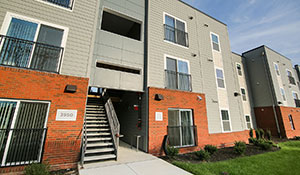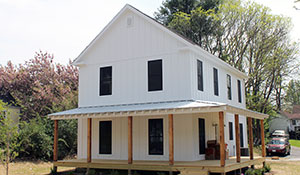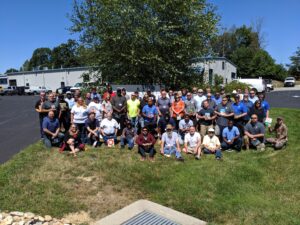CHP Energy Solutions Builders’ Boot Camp is an intensive, interactive, and collaborative learning workshop experience for building science and construction industry professionals. Builders’ Boot Camp takes place at the CHP Energy Solutions Training Center in Christiansburg, VA. Builders’ Boot Camp equips participants with the most current building science and construction industry information and skills needed to maintain an edge in the business and provide the highest quality services to their clients. CHP Energy Solutions Builders’ Boot Camp attendees will receive 14 BPI CEUs.
This years Builders’ Boot Camp provides the following sessions lead by industry recognized speakers:
Session: Understanding Moisture in Homes with the H.A.M. House Demonstration
Description: This presentation explores the critical role of moisture in residential buildings, focusing on how Heat, Air, and Moisture (H.A.M.) interact to impact efficiency, comfort, health, and safety. Using the H.A.M. House model, we will demonstrate how moisture enters homes through various pathways, including crawlspaces, basements, attics, and whole-house systems. We will also showcase practical solutions to mitigate moisture-related issues, emphasizing building science principles and real-world applications.
Objectives:
- Illustrate the movement of heat, air, and moisture in homes and their effects on indoor environments.
- Identify all pathways for moisture entry, including ventilation, human activity, and structural vulnerabilities.
- Demonstrate pressure differences and airflow-driven moisture movement using the H.A.M. House model.
- Present actionable solutions for moisture control in crawlspaces, basements, attics, and whole-house systems.
- Highlight the importance of building science in designing, constructing, and retrofitting homes for efficiency and occupant health.
Speakers: Anthony Cox is the Building Science Manager and Lead Trainer at Community Housing Partners, Energy Solutions division, with over 30 years of experience in Weatherization. Since 1999, he has played a vital role in developing and delivering training programs internationally for the home performance industry. Anthony is the creator of widely recognized training tools like House of Pressure® and H.A.M. House®, designed to illustrate building science principles effectively. Holding a business management degree and licenses in Master HVAC and Residential Building Analysis in Virginia, Anthony is also certified by the Building Performance Institute. Anthony is actively involved in national committees, contributing to the development of industry standards.
Nikkie Krueger is the Director of Marketing & Business Development for Therma-Stor’s residential indoor air quality brand – Santa Fe freestanding dehumidifiers and whole house ventilating dehumidifiers. She has been involved in the indoor air quality industry for over 20 years. She is a RESNET certified home energy rater, a member of the ACCA Manual Low Load Homes (LLH) Advisory Committee, sits on the building envelope committee for the Spray Polyurethane Foam Association, has completed the ACCA Residential Design for Quality Installation Certification, and recently served on the 2024 National Green Building Standard update committee. She educates builders, HVAC contractors, architects, engineers, crawl space contractors, and other professionals in the industry on the building science of ventilation and moisture control in buildings.
Session: Introduction to the Thermal Imaging of Structures
Description: This 3-hour session will teach the infrared fundamentals needed to properly use an infrared camera for all types of buildings. We will discuss the camera options available today and why today’s cameras offer a longer inspection season. We will discuss the conditions needed to perform the inspection for energy diagnostics and moisture detection. We will cover the basics in heat transfer and an understanding of Emissivity. We will also explore the use of an infrared camera when teamed up with a blower door to detect air movement through the envelope. Cameras will be available for hands-on demonstrations and training.
Speaker: Bill Fabian is Vice President of Training for Monroe Infrared Technology. He has been involved in Infrared since 1986 and is a Level III Master Thermographer. Bill has trained thousands of individuals in both the theory behind and the use of IR cameras for Predictive Maintenance and Building Diagnostics applications. He has extensive in-field experience working closely on with customers ranging from major high-rise buildings to commercial businesses to single-family homeowners. Significant Accomplishments: Bill has completed IR Inspections on more than 100 million square feet of flat roof systems making him one of the foremost experts in the country today. Bill was instrumental in developing a practical water intrusion inspection methodology for today’s moisture remediation industry.
He works closely with companies of all sizes to ensure that the most appropriate training, the right equipment, and the most thorough infrared inspections are provided to maximize the results of infrared imaging for his customers. Bill has delivered numerous presentations and papers on the use of thermal imaging equipment for home inspectors, energy, and electrical applications to a wide variety of businesses.
Session: Ductless Mini Splits – What, Where, and How!
Description: Learn the current and future market applications of ductless mini-split systems. Where are they headed? Where are they most beneficial to use? What are some of the dos and don’ts when considering one of these systems. Come to learn from professionals that have worked with these systems from manufacturing to production installation!
Speakers: Michael Flannigan is the Executive Vice President of Quick AC Quote. With over 25 years in the HVAC industry, he began his career cleaning oil boilers to make extra money. Since then, he has been an HVAC installer, service technician, salesman and service manager. He helped grow Michael & Son Services’ HVAC division from the ground floor to $10M, and was later recruited by Trane to coach HVAC businesses on best business practices and training for their staff. During this time he developed a large network of HVAC contacts throughout VA.
As Executive Vice President of Quick AC Quote, Michael oversees the direction, training, and growth of Quick AC Quote’s multi-faceted operations. His company’s primary focus is the replacement of inefficient heat pumps with new, high efficiency systems with an average volume of 100 system replacements per month. They also perform installation of permanent dehumidifiers, weatherization, and insulation services. Quick AC quote is a SWAM certified business and employs a staff of 20. Michael holds a Master of HVAC and has received multiple leadership certifications including earning is mini-MBA from The University of Richmond. Michael and his wife Gina, co-owner of Quick AC Quote, grew up in the west-end of Richmond, have been married for 15 years, and have four grown children, one of which is a sophomore here at the University of Richmond.
Charlie Jesse is an accomplished HVAC Operations Manager with over 15 years of experience leading teams and driving operational excellence in residential and commercial HVAC sectors. Currently serving as Vice President of Operations at Quick AC Quote, Charles oversees a diverse team dedicated to energy efficiency improvements, streamlining processes, and optimizing project delivery.
His expertise spans managing large-scale HVAC installations, vendor negotiations, cost control, and implementing industry best practices to ensure quality and compliance. Prior to his current role, Charles held Territory Manager positions at Trane and Carrier Enterprise, where he provided technical support and sales leadership to contractor partners across multiple markets.
Charles began his career with Michael and Son Services, rising from a duct cleaner to Install Manager by demonstrating strong leadership and technical skills. Known for his hands-on approach, he excels at training teams, troubleshooting complex issues, and fostering strong relationships with clients and vendors.
Committed to continuous learning, Charles has completed numerous technical trainings from leading HVAC manufacturers and holds certifications that support his expertise in energy-efficient solutions. He is passionate about driving business growth while maintaining safety and customer satisfaction.
Brian Sanford – Mitsubishi/Trane Brian – With two decades in sales and nearly a decade immersed in HVAC, I’ve found my sweet spot in leading the charge in Ductless HVAC. As the Ductless Development Manager overseeing $20MM in business across the Mid-Atlantic, I’m focused on smarter, more efficient heating and cooling solutions, that take pressure off the power grid and deliver custom comfort without compromise.
A big part of my work involves helping contractors and builders find whole-home HVAC solutions in both new construction and replacement. Ductless systems aren’t just a sleek upgrade, they’re a long term win for end users, delivering immediate comfort, lower energy bills, and lasting efficiency. I’m a LEAP Graduate, a Top 10 Trane Account Manager, and a big believer in where this industry is headed: cleaner, simpler, and more sustainable. Ductless isn’t the future, it’s the now, and I’m here to help others see it.
Session: The Air We Breathe – Controlling Indoor Air Quality
Description: Indoor Air Quality (IAQ) in practical terms means knowing what to look for and understanding how to create feasible, measurable, and verifiable solutions. We’ll explore how a building as a system of systems approach that ignores IAQ puts people and companies at risk. After this course, attendees will have a pragmatic approach to avoid common air quality problems, and a way to address the presence of common air pollutants, including radon, particulate matter, carbon monoxide, carbon dioxide, formaldehyde, ozone, and volatile organic compounds.
Objectives:
- Why IAQ matters. What we can realistically measure. What can we really do about it.
- How is energy efficiency work connected to indoor air quality, intentionally or unintentionally.
- Indoor air quality and building code, new vs. existing buildings.
- Three case studies in a mixed humid climate zone: IAQ diagnostics and solutions.
- Future proofing for IAQ, efficiency, and comfort.
- Monitors, Filters, and Fancy Technology: what they do and what they don’t.
Speaker: Monica Rokicki co-founded Better Building Works LLC in 2011 to bring building science principles to the design, construction, and maintenance of existing and newly constructed buildings. Prior experience includes ten years as Director of Design and Sustainability at Balzer and Associates, Executive Director of an international scientific non-profit, and leadership on various boards including the Roanoke Regional Home Builders Association and the US Green Building Council. When not waxing poetic about the joys and conundrums of building science and the perfect Vesper Martini, she enjoys spending time with her husband, Ivan, their good dog, Ecco, and their bad dog, Fibonacci.


